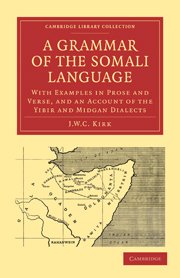 A Grammar of the Somali Language
A Grammar of the Somali Language Book contents
- Frontmatter
- Preface
- Contents
- Bibliography
- ERRATUM
- INTRODUCTION
- PART I ORTHOGRAPHY
- PART II ACCIDENCE
- PART III SYNTAX OF SIMPLE SENTENCES
- PART IV SYNTAX OF COMPOUND SENTENCES
- APPENDIX I Seasons, months, days
- APPENDIX II Money, weights, measures
- APPENDIX III Tribes and Sub-tribes
- SOMALI STORIES, AND NARRATIVE
- TRANSLATIONS OF THE STORIES
- SOMALI SONGS (WITH TRANSLATIONS)
- THE DIALECTS OF THE OUTCAST TRIBES, MIDGAN AND YIBIR
- Index
TRANSLATIONS OF THE STORIES
Published online by Cambridge University Press: 05 July 2011
- Frontmatter
- Preface
- Contents
- Bibliography
- ERRATUM
- INTRODUCTION
- PART I ORTHOGRAPHY
- PART II ACCIDENCE
- PART III SYNTAX OF SIMPLE SENTENCES
- PART IV SYNTAX OF COMPOUND SENTENCES
- APPENDIX I Seasons, months, days
- APPENDIX II Money, weights, measures
- APPENDIX III Tribes and Sub-tribes
- SOMALI STORIES, AND NARRATIVE
- TRANSLATIONS OF THE STORIES
- SOMALI SONGS (WITH TRANSLATIONS)
- THE DIALECTS OF THE OUTCAST TRIBES, MIDGAN AND YIBIR
- Index
Summary
HABIYO BUTIYA (LAME HABIYO).
There once was a Sultan who had a son, whose mother was dead. But the Sultan married another wife, and went on a pilgrimage. Now a certain Jew was a friend of the Sultan's wife, but the Sultan's son and the Jew were enemies. The Jew said to the woman, “Let us kill the boy.” So she mixed some poison in his food. But the boy had a mare, who knew everything, and the mare said to the boy, “Don't eat the food”; and when the food was put before him, the boy refused it. The next day the Jew came to the Sultan's wife and said, “When the Sultan comes back, say you are sick, and when he asks what will cure you, tell him the liver of the mare.” The next day the Sultan came. Then she laid a skin on the bed and placed under it some fig leaves, and when she lay down the leaves crackled. Then the Sultan said, “What is the matter with you?” and she said, “I have a pain in my ribs.” “What will cure you?” he said; and she answered, “The liver of your son's mare.” The Sultan called the boy and said, “I intend to kill your mare for your stepmother.”
- Type
- Chapter
- Information
- A Grammar of the Somali LanguageWith Examples in Prose and Verse, and an Account of the Yibir and Midgan Dialects, pp. 160 - 169Publisher: Cambridge University PressPrint publication year: 2010First published in: 1905
